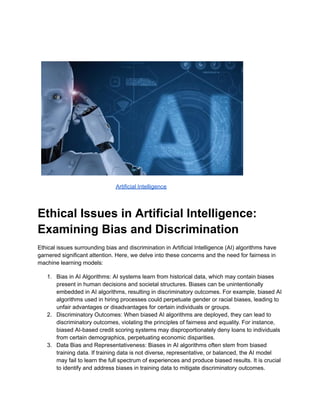
In the digital age, the intersection of information security and advanced computational systems raises profound ethical questions. This section delves into the complex dynamics of how automated decision-making processes can inadvertently perpetuate societal imbalances. By examining the mechanisms through which these systems operate, we aim to shed light on the critical need for safeguards that ensure equitable outcomes.
The integration of sophisticated algorithms in various online platforms has revolutionized how data is processed and utilized. However, this advancement also brings to the fore issues related to the integrity of these systems. How do they handle sensitive information, and what measures are in place to prevent the propagation of biases that could lead to unfair practices?
This discussion is not merely theoretical; it has tangible implications for real-world scenarios. From recruitment processes to credit scoring, the influence of these technologies is pervasive. Ensuring that they do not inadvertently discriminate is paramount to maintaining a fair and just society. This article explores strategies and frameworks designed to mitigate these risks, advocating for a more balanced approach to the deployment of these powerful tools.
Understanding Data Privacy in AI

This section delves into the escalating phenomenon of automated data gathering, driven by advanced computational systems. As these technologies evolve, they reshape the landscape of information collection, influencing various aspects of modern life.
The advent of sophisticated computational tools has led to a significant increase in the volume and variety of data collected. Here are some key points to consider:
- Expansion of data sources: From social media to IoT devices, the range of data sources has broadened dramatically.
- Real-time data collection: Modern systems can now gather and process data in real time, enhancing the immediacy and relevance of information.
- Increased data granularity: The data collected is not only more voluminous but also more detailed, providing deeper insights into user behaviors and preferences.
The implications of this surge in data collection are multifaceted:
- Enhanced decision-making: Organizations can make more informed decisions based on comprehensive data analysis.
- Personalization: Services and products can be tailored more precisely to individual needs and preferences.
- Security and surveillance: The increase in data collection raises concerns about user surveillance and the potential misuse of personal information.
As we navigate this era of extensive data collection, it is crucial to consider the ethical and legal frameworks that govern these practices. Balancing the benefits of enhanced data usage with the protection of individual rights is a complex but essential task.
The Rise of AI-Driven Data Collection

In recent years, there has been a significant surge in the use of automated systems to gather information. This section delves into the mechanisms and implications of these advanced collection methods, focusing on how they operate and the broader impact they have on society.
The advent of sophisticated algorithms has revolutionized the way organizations compile and analyze vast amounts of information. These systems are designed to process and interpret data at speeds and scales previously unimaginable. However, this capability also raises important questions about the nature of the information being collected and how it is used.
One of the key features of these advanced collection techniques is their ability to learn and adapt over time. By continuously refining their processes based on new inputs, these systems can enhance their accuracy and efficiency. This dynamic learning process, while beneficial, also means that the systems can inadvertently develop preferences or patterns that may not align with equitable outcomes.
Furthermore, medium.com the sheer volume of information processed by these systems can obscure the origins and context of the data, making it difficult to ensure that all sources are treated fairly. This lack of transparency can lead to unintended consequences, such as skewed results that favor certain groups over others.
In conclusion, while AI-driven data collection offers unprecedented opportunities for efficiency and insight, it also presents significant challenges. Addressing these issues requires a careful balance between leveraging the benefits of advanced technology and safeguarding against potential harms.
How AI Algorithms Can Inadvertently Discriminate
This section delves into the unintended consequences of automated decision-making systems, particularly how they may unintentionally perpetuate societal inequalities. Despite the goal of enhancing efficiency and accuracy, these systems can sometimes mirror and amplify the prejudices present in their training data, leading to outcomes that are skewed against certain groups.
The issue arises primarily due to the inherent nature of machine learning algorithms, which learn patterns from the data they are trained on. If this data contains historical biases, the algorithms can replicate and even exacerbate these biases in their predictions or decisions. Here are some key points to consider:
- Data Representation: If certain demographics are underrepresented or misrepresented in the training data, the system may develop a skewed understanding of these groups, leading to discriminatory outcomes.
- Algorithmic Complexity: The complexity of AI models can sometimes make it difficult to trace why a particular decision was made, complicating efforts to correct discriminatory patterns.
- Feedback Loops: AI systems that rely on feedback to improve can inadvertently reinforce biases if the feedback itself is biased, leading to a cycle of discriminatory outcomes.
To mitigate these issues, it is crucial to implement robust methods of auditing and adjusting AI systems. This includes:
- Regularly reviewing and diversifying the training data to ensure it accurately represents all relevant demographics.
- Developing transparent algorithms that allow for the examination and understanding of decision-making processes.
- Incorporating ethical guidelines and fairness metrics into the development and deployment of AI systems.
By addressing these challenges proactively, the potential for AI systems to inadvertently discriminate can be significantly reduced, ensuring that these technologies serve all members of society equitably.
The Role of Bias in AI Decision-Making
This section delves into the critical issue of how preconceived notions can influence the outcomes of automated systems. It explores the mechanisms through which these predispositions are inadvertently incorporated into the decision-making processes of AI, potentially leading to inequitable results.
Bias in AI systems typically arises from several sources:
- Inadequate or skewed training data that reflects societal prejudices.
- Algorithmic designs that inadvertently amplify existing disparities.
- Lack of diversity in the development teams, leading to blind spots in system design.
The impact of bias can be profound, affecting various sectors such as:
- Credit scoring, where certain demographics might be unfairly disadvantaged.
- Hiring processes, potentially excluding qualified candidates based on non-job-related criteria.
- Law enforcement, where biased predictions can lead to unequal treatment under the law.
To mitigate the effects of bias in AI, several strategies can be employed:
- Regular auditing of algorithms to detect and correct biases.
- Inclusion of diverse perspectives in the development and testing phases.
- Transparent reporting of AI decisions to allow for public scrutiny and accountability.
Ultimately, addressing bias in AI systems is crucial for ensuring that these technologies serve the needs of all users equitably. It requires a concerted effort from developers, policymakers, and the public to foster a more inclusive and just digital environment.
Strategies for Ensuring Fairness in AI Systems
This section delves into the methodologies and approaches aimed at promoting impartiality within automated decision-making frameworks. Ensuring that these systems operate without prejudice is crucial for maintaining public trust and ethical standards.
To achieve this, several strategies have been proposed and implemented. Below is a table summarizing key tactics employed to enhance the equity of AI systems:
| Strategy | Description | Example |
|---|---|---|
| Algorithmic Auditing | Regular examination of algorithms to detect and correct any forms of unfairness. | Google's AI auditing framework that checks for potential biases in their search algorithms. |
| Diverse Data Sets | Using comprehensive and representative data sets to train AI models, ensuring they reflect a wide range of perspectives. | IBM's use of diverse datasets in facial recognition software to avoid racial or gender biases. |
| Transparency | Making the decision-making processes of AI systems clear and understandable to users. | Microsoft's commitment to transparency in AI, providing detailed explanations of how their systems make decisions. |
| Stakeholder Engagement | Involving a broad range of stakeholders in the development and deployment of AI systems to ensure diverse viewpoints are considered. | Facebook's AI ethics board, which includes members from various backgrounds and expertise. |
Implementing these strategies not only helps in mitigating existing biases but also fosters a culture of continuous improvement in the ethical deployment of AI technologies. It is essential for developers, policymakers, and users to collaborate in these efforts to ensure that AI systems serve the needs of all individuals equitably.
Legal Frameworks Governing AI and Privacy
This section delves into the intricate web of regulations that oversee the intersection of advanced computational systems and individual confidentiality. As these technologies continue to evolve, it becomes imperative to understand the legal landscape that shapes their development and implementation. The focus here is on how these frameworks aim to balance innovation with the protection of personal information, ensuring that the advancement of these systems does not compromise fundamental rights.
Overview of Current Regulations
In recent years, numerous jurisdictions have enacted laws to govern the use of sophisticated algorithms and their impact on user confidentiality. These regulations vary significantly, reflecting the diverse cultural, economic, and political contexts of different regions. For instance, some countries have adopted stringent measures to protect user data, while others focus more on fostering technological growth with less restrictive policies.
Key Components of AI-Related Legislation
The legislation typically includes provisions that address the collection, processing, and storage of user information. It also outlines the responsibilities of entities deploying these technologies, emphasizing transparency and accountability. Compliance with these laws often requires significant changes to business practices, including the implementation of robust data protection measures and regular audits to ensure adherence to legal standards.
Challenges in Enforcement
Despite the existence of these frameworks, enforcement remains a significant challenge. The rapid pace of technological advancement often outstrips the ability of regulatory bodies to keep up, leading to gaps in oversight. Additionally, the global nature of the internet complicates enforcement, as violations can occur across borders, making jurisdiction unclear.
Future Directions for Legal Frameworks
Looking ahead, there is a growing consensus on the need for more comprehensive and harmonized legal approaches to manage the complexities of advanced computational systems. This includes the potential for international cooperation to create unified standards that can effectively address the challenges posed by these technologies. As these discussions continue, it is crucial for stakeholders to engage in constructive dialogue to ensure that legal frameworks evolve in tandem with technological developments, safeguarding both innovation and individual rights.
Public Awareness and Education on AI Privacy
In this section, we delve into the critical need for enhancing understanding and vigilance among the general populace regarding the safeguarding of personal information in the context of advanced computational systems. As these technologies become increasingly integrated into daily life, it is imperative that individuals are equipped with the knowledge to protect their sensitive details from potential misuse.
The Importance of Education
Education plays a pivotal role in empowering users to navigate the complexities of modern technology responsibly. By providing clear, accessible information about how personal data is collected, processed, and potentially exploited by automated systems, we can foster a more informed community. This awareness is not only about understanding the mechanisms of data handling but also about recognizing the ethical implications and the rights individuals possess concerning their own information.
Strategies for Raising Awareness
Several strategies can be employed to enhance public understanding. Firstly, incorporating discussions about data protection into educational curricula from an early age can instill good practices and a sense of responsibility. Secondly, public campaigns that use straightforward language and relatable scenarios can help demystify the often technical and abstract concepts associated with data security in automated systems. Additionally, collaborations between tech companies, educators, and policymakers can lead to the development of comprehensive resources and guidelines that are readily available to the public.
The Role of Media and Technology
Media and technology platforms also have a significant role to play in this educational endeavor. By integrating privacy tips and reminders into their interfaces, these platforms can directly influence user behavior. Moreover, creating engaging and informative content that addresses common misconceptions and fears about data handling can significantly boost public knowledge and confidence in managing personal information within the digital realm.
Ultimately, fostering a well-informed public is a collective responsibility that requires the concerted efforts of all stakeholders involved in the development and regulation of automated systems. Through continuous education and awareness-raising initiatives, we can build a more secure and respectful digital environment for all users.
Future Directions for Ethical AI Development

As we advance in the realm of computational systems, it is imperative to steer our innovations towards a more ethical framework. This section delves into the prospective paths that could lead to a more responsible and equitable deployment of advanced algorithms, ensuring they align with societal values and respect individual rights.
Ethical Guidelines and Standards: The evolution of ethical guidelines is crucial. These should encompass principles such as transparency, accountability, and inclusivity, guiding developers and organizations in creating systems that are not only effective but also morally sound.
Education and Training: Enhancing the educational curricula to include ethical considerations in AI is essential. This involves training not only technologists but also policymakers and end-users about the implications of these technologies, fostering a more informed and responsible approach to their use.
Inclusive Design: Future AI systems should be designed with a focus on inclusivity, ensuring that they do not perpetuate or exacerbate existing inequalities. This involves incorporating diverse perspectives in the design process and rigorously testing systems across various demographics to minimize unintended biases.
Regulatory Frameworks: Strengthening and expanding regulatory frameworks is necessary to keep pace with the rapid advancements in AI. These frameworks should aim to protect the rights of individuals while also encouraging innovation, striking a balance between regulation and freedom.
Public Engagement: Engaging the public in discussions about the future of AI is vital. This includes transparent communication about the capabilities and limitations of AI systems, as well as their potential impacts on society, thereby empowering the public to participate in shaping the ethical landscape of AI.
In conclusion, the future of ethical AI development hinges on a collaborative effort involving technologists, ethicists, policymakers, and the public. By focusing on these directions, we can ensure that AI technologies serve the common good and respect the dignity of all individuals.
